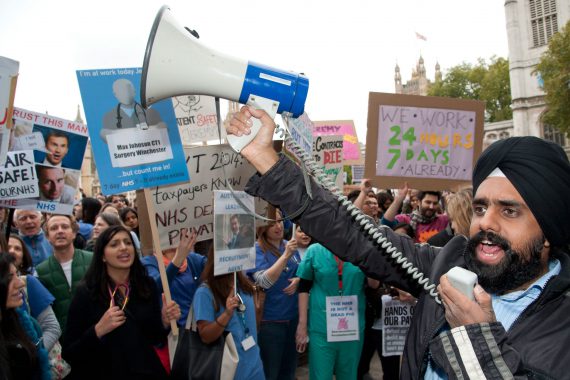The BMA’s junior doctor committee is ‘retaining the option to ballot for industrial action later within the year’ if the Government does not change its stance on their pay.
In the meantime, the committee has vowed to ‘intensify’ campaigning, the BMA has said.
It comes as junior doctors were excluded from the 3% NHS pay increase this year, and instead only awarded a 2% increase agreed in a pre-pandemic, multi-year deal.
The decision was taken as a BMA survey of over 6,000 junior doctors found that:
- Nearly all respondents (96.6%) said the uplift was either completely unacceptable (63.8%) or inadequate (32.8%).
- 93.5% said their morale has decreased as a result of being excluded from the uplift.
- 90.7% feel the Government doesn’t value their work.
The junior doctor committee also decided to withdraw from the DDRB process by refusing to give evidence for the next pay round, echoing the ARM’s concerns over the body’s effectiveness and independence from Government.
The survey had also been aimed at determining junior doctors’ willingness to take industrial action – however the BMA declined to provide those survey results at this time.
A BMA spokesperson said: ‘The survey contained a range of questions related to pay, including some around industrial action. The primary purpose of the survey was to inform JDC’s strategy, so we are only publishing some results at present.’
The BMA’s ‘Fairness of the Frontline’ campaign is calling for fair pay for junior doctors following the unprecedented demands of the pandemic, which it said had taken a serious toll on the mental and physical health of junior doctors.
BMA junior doctors committee co-chairs Dr Sarah Hallett and Dr Mike Kemp said: ‘We were clear when the Westminster Government excluded junior doctors in England from the pay uplift in July – ignoring the immense efforts of trainees during the pandemic – that this was completely unacceptable.
‘Since then, we have repeatedly urged the Government to revisit its decision, and award junior doctors with an uplift that not only recognises the sacrifices trainees have made over the last 20 months, but one that also makes up for more than a decade of real-terms pay cuts. The Government has not responded to these requests.’
Junior doctors’ real-terms, take-home pay has dropped by almost a quarter (23%) since 2009, they said.
They added: ‘No doctors discuss the prospect of industrial action lightly, but as our survey makes abundantly clear morale is at rock bottom. The decisions by ministers to ignore the efforts of junior doctors are to blame, and they are the ones who can make a difference here; they must reconsider their approach urgently.’
Junior doctors last took industrial action against the Government in 2016, in a bid to reject wide-ranging and highly unpopular contract changes. However, the action was ultimately unsuccessful, when then-health secretary Jeremy Hunt decided to impose the junior doctor contract.
















Please do. If you do, GPs will vouch to not refer to hospital for a week. I think we can organise that and increase the scripts of co-amoxiclav, opiods and sertraline on your behalf.
Go get ’em.